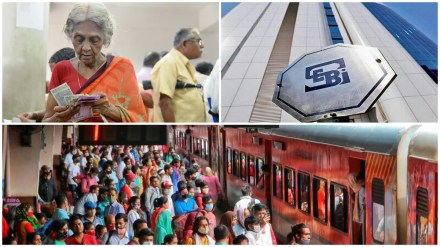Many important regulatory changes are going to come into effect across banks, government departments, UPI, gaming, and regulatory bodies in India on Wednesday. These include updates in banking charges, pension rules, postal services, railway bookings, and cheque clearing. Let’s find out what are these changes and what becomes more cheaper and expensive going forward.
UPI transactions
P2P “collect request” or pull transaction feature will be discontinued to improve security and reduce fraud risks.
RBI cheque clearing
The Reserve Bank of India will move from batch-based cheque processing to continuous clearing. This change will happen in two phases, the first one will start on October 4, 2025, and the second one will start on January 3, 2026.
Bank Charges (HDFC, PNB, Yes Bank)
New and revised fees have been announced for lockers, debit cards, ATM withdrawals, salary accounts, and cases of service failure. This means higher charges and stricter rules for customers.
Bank locker agreements
Since new RBI norms come into effect on Oct 1, customers will have to update their bank locker agreements.
Interest Rate on Loans
The RBI has allowed banks to decide interest rates on floating-rate loans. This means borrowers will see the benefit of rate changes sooner, instead of waiting for three years. From 1 October, banks can also give borrowers the choice to switch from fixed to floating interest rates.
Loans Against Gold/Silver
The RBI has changed the rules to let scheduled commercial banks give working capital loans to jewellers. Tier 3 and Tier 4 Urban Co-operative Banks can also give loans to businesses that use gold in their manufacturing or processing, starting 1 October 2025.
Capital Rules for Perpetual Debt Instruments (PDIs)
The RBI has updated rules for PDIs, including those in foreign currency or rupee bonds sold overseas. This will help banks raise more capital from global markets. The changes take effect from 1 October 2025.
Gold metal loans
Banks will now be allowed to offer longer repayment periods of up to 270 days, instead of the current 180 days. They can also extend such loans to domestic non-manufacturers who outsource jewellery production.
Exposure rules for foreign banks
The RBI has proposed that foreign banks in India must clearly explain how they calculate their exposures, manage risks, and link thresholds to their Tier-1 capital.
IRCTC Railway Ticket Booking
New rules for buying general tickets online through IRCTC’s website and mobile app will begin from October 1. Aadhaar-authenticated users will see updated booking policies, aimed at preventing misuse of the ticket reservation system. FOr example, first 15 minutes of general ticket reservation will be restricted to Aadhaar-verified users which means no agent will be able to do the booking for first 15 minutes.
India Post Speed Post service
From October 1, Speed Post rates have been revised. GST will now be shown separately on bills, and customers can choose OTP-based delivery for added security. India Post says these steps will make the service safer, more transparent, and easier to use. There will be an OTP-based delivery system.
National Pension System (NPS) and reforms
The Pension Fund Regulatory and Development Authority (PFRDA) has updated the Central Recordkeeping Agency (CRA) fees for members of UPS, NPS, NPS Lite, NPS Vatsalya, and Atal Pension Yojana. The new fee structure will apply from October 1.
NPS equity investment
From October 1, non-government NPS subscribers will be allowed to invest up to 100% of their contributions in equities. They can also hold multiple schemes under a single PRAN across different recordkeeping agencies.
Online gaming
The Promotion and Regulation of Online Gaming Act will stop real-money games and betting apps but will allow e-sports and skill-based games. The purpose is to protect young people and lower the risks of gambling.
NRI-PPF
NRIs will be no longer be able to open new PPF accounts and also the extensions will be stopped. This is definitely going to impact NRI savers and investors.
GST e-invoicing
A new turnover limit has been set for businesses that must issue e-invoices under GST. This means more businesses will need to follow the rule.
Road safety fines
Some states have increased fines for certain traffic violations. The aim is to improve road safety and stricter enforcement.
LPG subsidy
Changes have been made in how subsidies are given under some schemes, and LPG prices may also be revised. This could affect household expenses.
SEBI F&O rules
New limits have been introduced for trading in single-stock derivatives. Individuals can use up to 10% of the market-wide position limit (MWPL), while institutions can use up to 20%. This is to keep markets stable and control risks.
